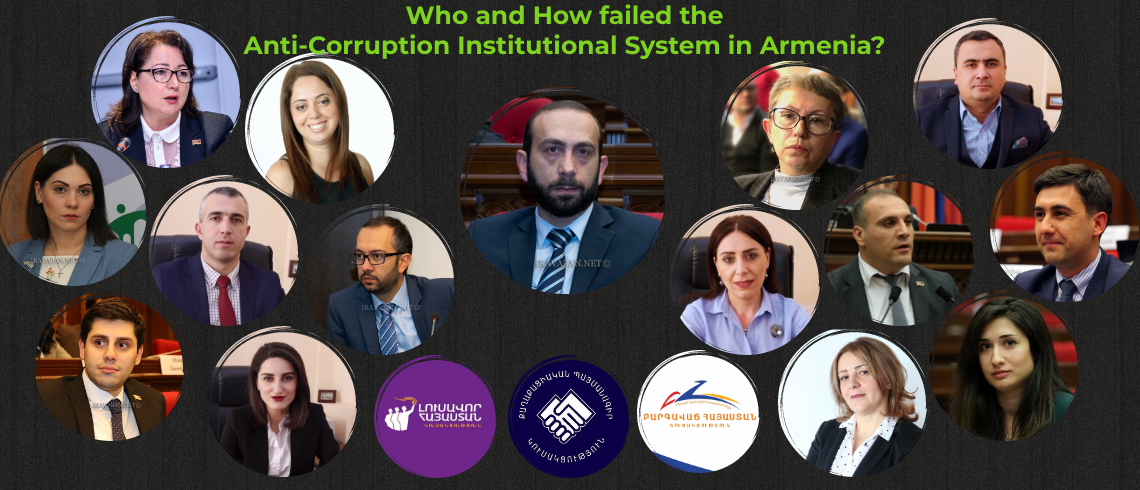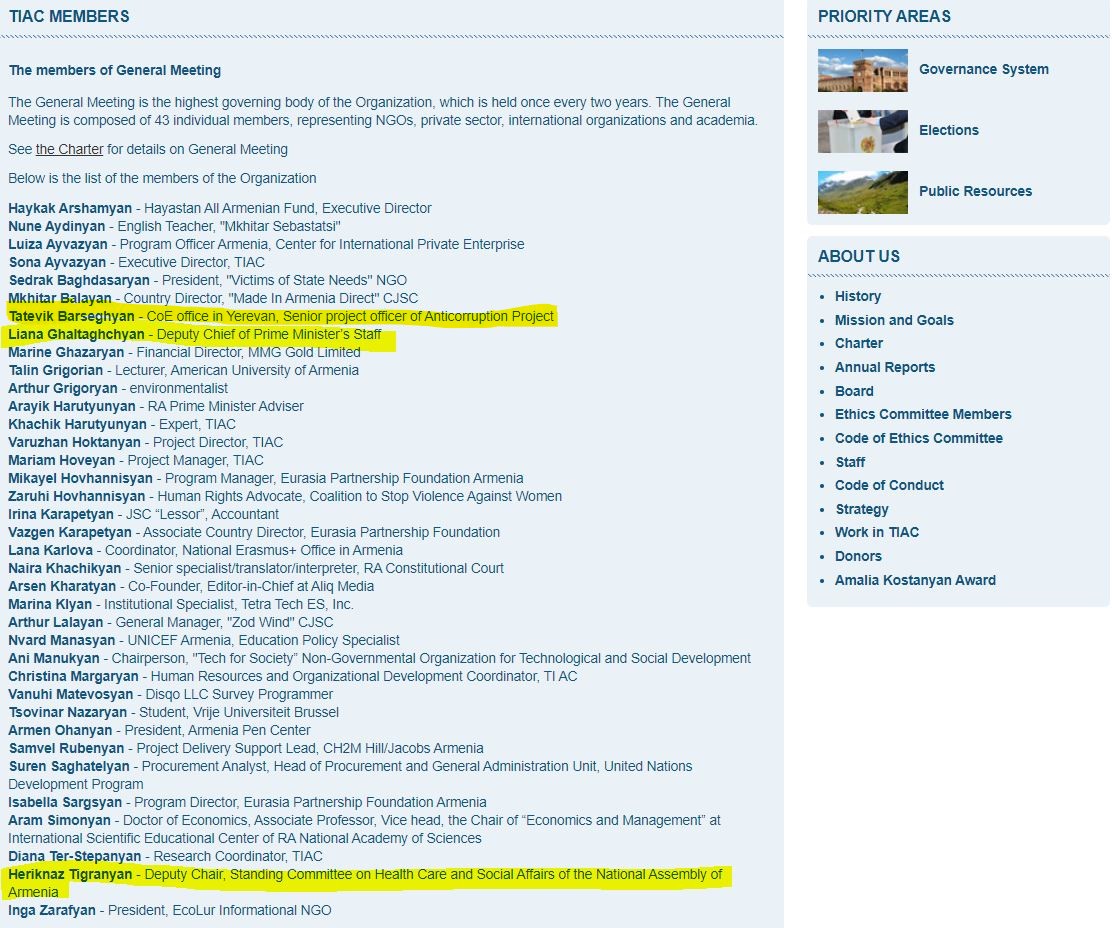In 2016, the largest network of anti-corruption NGOs in Armenia, the CSO Anti-Corruption Coalition of Armenia, presented a 7-point roadmap for anti-corruption reforms. The map was discussed for a long time with both the government and CSOs; it was assumed that it would work and make a significant difference in the field. A large package of anti-corruption legislation was adopted, which, according to experts, was promising for having results in the fight against corruption. Nevertheless, the institutional anti-corruption bodies, which were established after 2018, were unfortunately accompanied by political influences, sponsorship, and led the anti-corruption struggle in Armenia to a deadlock.
PART 1-A. Who and how failed the process of appointing the members of the Corruption Prevention Commission?
According to the amendments made to the Law on the Corruption Prevention Commission in 2020, Article 9, paragraph 4 stipulates: “The President of the National Assembly forms a Competition Board for the election of a candidate for the position of a member of the Commission.” According to point 5 of the same article, the Board shall be composed of the candidates nominated by the the Government, the factions of the National Assembly or the Council of the National Assembly, the Supreme Judicial Council, the Human Rights Defender and the Chamber of Advocates (Each nominates one candidate).
Article 11 of the main document of the law of 2017 edition, defined the following procedure for the formation of the Competition Board: ” The Chairperson of the Constitutional Court, The Human Rights Defender, the opposition factions of the National Assembly, the Public Council, and the Chamber of Advocates shall each appoint one member of the Board. The Board member of the opposition factions of the National Assembly shall be appointed by consensus.” This article expired on 13 September, 2019.
In 2018, when for the first time, according to the procedure defined by law, the Corruption Prevention Commission (CPC) was to be formed, Mr. Ara Babloyan, the President of the RA National Assembly of the 6th convocation, addressed letters regarding nomination of candidates to the Board to the Human Rights Defender, the Chairpersons of the Constitutional Court, Chamber of Advocates, the Public Council and the opposition factions of the National Assembly. According to the letters received in response the following persons were nominated to be included in the Competition Board:
– Human Rights Defender Arman Tatoyan nominated Mikael Khachatryan, head of the ombudsman’s international cooperation department.
– Chairman of the Public Council Vazgen Manukyan nominated Hovhannes Hovhannisyan, Chairman of the Civil Society Development Committee of the Public Council.
– NA opposition parties nominated Ms Naira Zohrabyan by consensus. The letter was signed by Vahe Enfiajyan, the secretary of “Tsarukyan” faction and Gevorg Gorgisyan, the secretary of “Yelq” faction.
– President of the Chamber of Advocates Ara Zohrabyan nominated lawyer Ms Mariam Zadoyan. It should be noted that according to the letter, Mariam Zadoyan was elected as a result of an open competition held by the Chamber of Advocates. In fact, the Chamber of Advocates was the only one to make a competitive selection.:
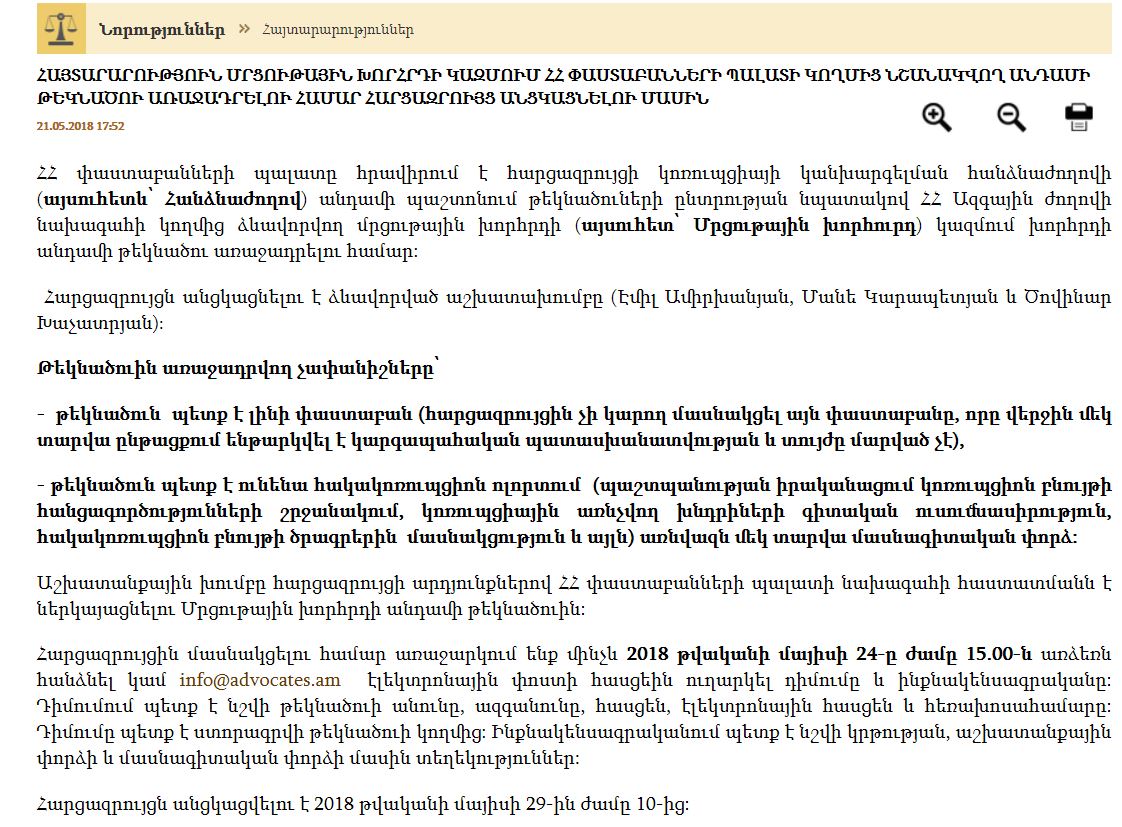
It was with this composition that the first staff of the Competition Boardfor the election of CPCmembers was formed.
Back on 31 July, 2019, the Advisor to the Speaker of the National Assembly Suzanna Avetisyan, in response to a written inquiry of Iravaban․ net, stated that 6 working sittings of the Competition Board were held during the activity of the National Assembly of the 6th convocation, and the minutes of the mentioned sittings are with the Board members.
In 2018, when the composition of the NA changed, thanks to the Speaker of the National Assembly Ararat Mirzoyan, the Competition Board remained unclear (hanging in the air).
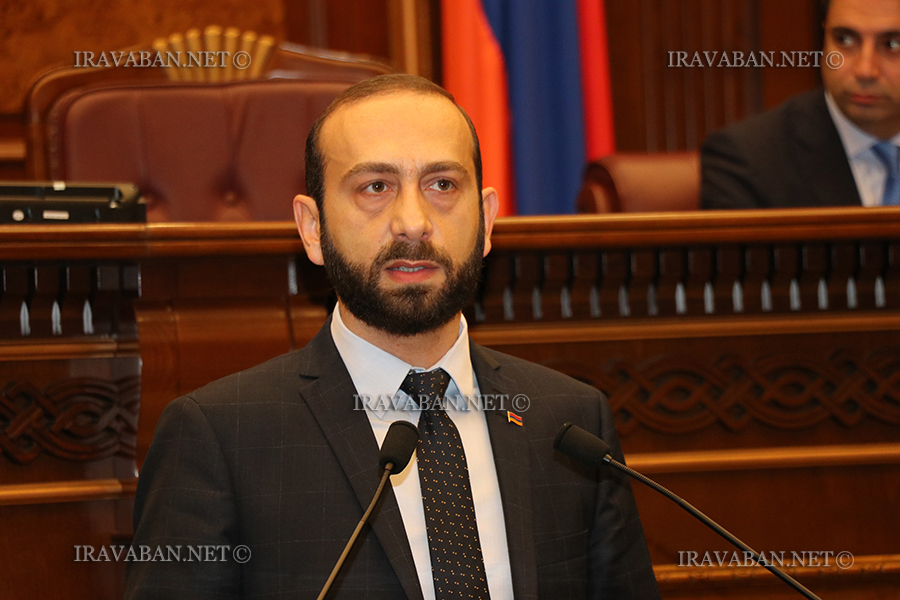
Ararat Mirzoyan
The latter, due to the narrow, personal and group aspirations, thwarted the work of the Competition Board. Continuing Ararat Mirzoyan’s this initiative, some deputies of the 7th convocation of the National Assembly initiated an unfounded, illegal process, with the aim of repealing the order # K-195 signed by the RA NA President Ara Babloyan on 20 June, 2018, by which the Competition Board was formed. The deputies conditioned the mentioned with the fact that the order signed by the President of the NA of the 6th convocation loses its force by the force of the NA of the 7th convocation. The fact that this justification, to put it mildly, has nothing to do with law, for which it was enough just to get acquainted with the RA Law on the Corruption Prevention Commission and the legislation regulating the activities of the Competition Board, we think does not need deep justification. Regarding the above-mentioned, the NA also informed that according to Article 11, Part 2 of the Law on the Corruption Prevention Commission, there was a need to comply with the requirements of the above-mentioned law the K-195 order of the NA Speaker of 20 June, 2018. For that purpose, on 24 January, 2019, new letters were sent to the Constitutional Court, the Human Rights Defender, the NA opposition factions, the Public Council and the Chamber of Advocates. Moreover, the National Assembly did not even consider it necessary to justify which part of the signed order or which provision contradicts the second part of Article 11, as a result of which that necessity arose.
However, let us return to the decision. It defined:
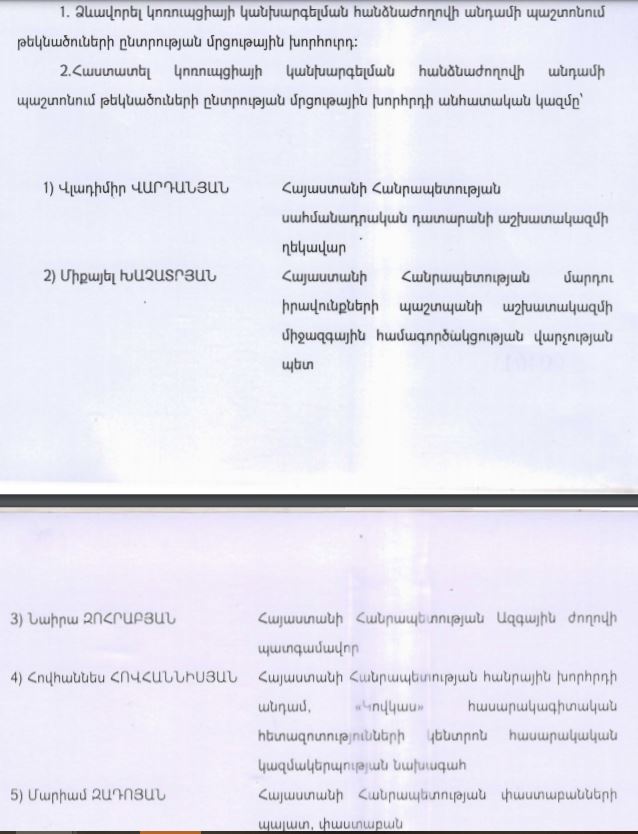
| 1) | Vladimir VARDANYAN | Chief of Staff of the Constitutional Court |
| 2) | Mikael KHACHATRYAN | Head of the ombudsman’s international cooperation department. |
| 3) | Naira ZOHRABYAN | NA Deputy |
| 4) | Hovhannes HOVHANNISYAN | Chairman of the Civil Society Development Committee of the Public Council. |
| 5) | Mariam ZADOYAN | Laywer, Chamber of Advocates |
Examining this order, any reasonable observer will have a question, if the Competition Board was formed in 2018 with the participation of all five members, then: “Why new letters were sent to the structures?” “How can a body that is already functioning be formed again?” However, NA President Ararat Mirzoyan initiated an obviously illegal, and unlawful process; new letters were sent to the bodies forming the Competition Board, making obvious the personal interest in the formation process of the CPC and the functioning of the Board.
It is interesting that the mentioned structures nominated exclusively the candidacies of the same people, who were nominated the previous time.
After that, the President of the National Assembly Ararat Mirzoyan, realizing that within the framework of the current legal regulations cannot have any influence on the nominations of independent bodies, as a NA deputy in 2019 authored the Draft Law “On Making Amendments to the Law on the Corruption Prevention Commission”.
The draft was adopted and entered into force, according to which amendments were made to Article 9 of the Law on CPC, by which the Competition Board was abolished, the procedure for direct nomination of members of the CPC without a competition was established.
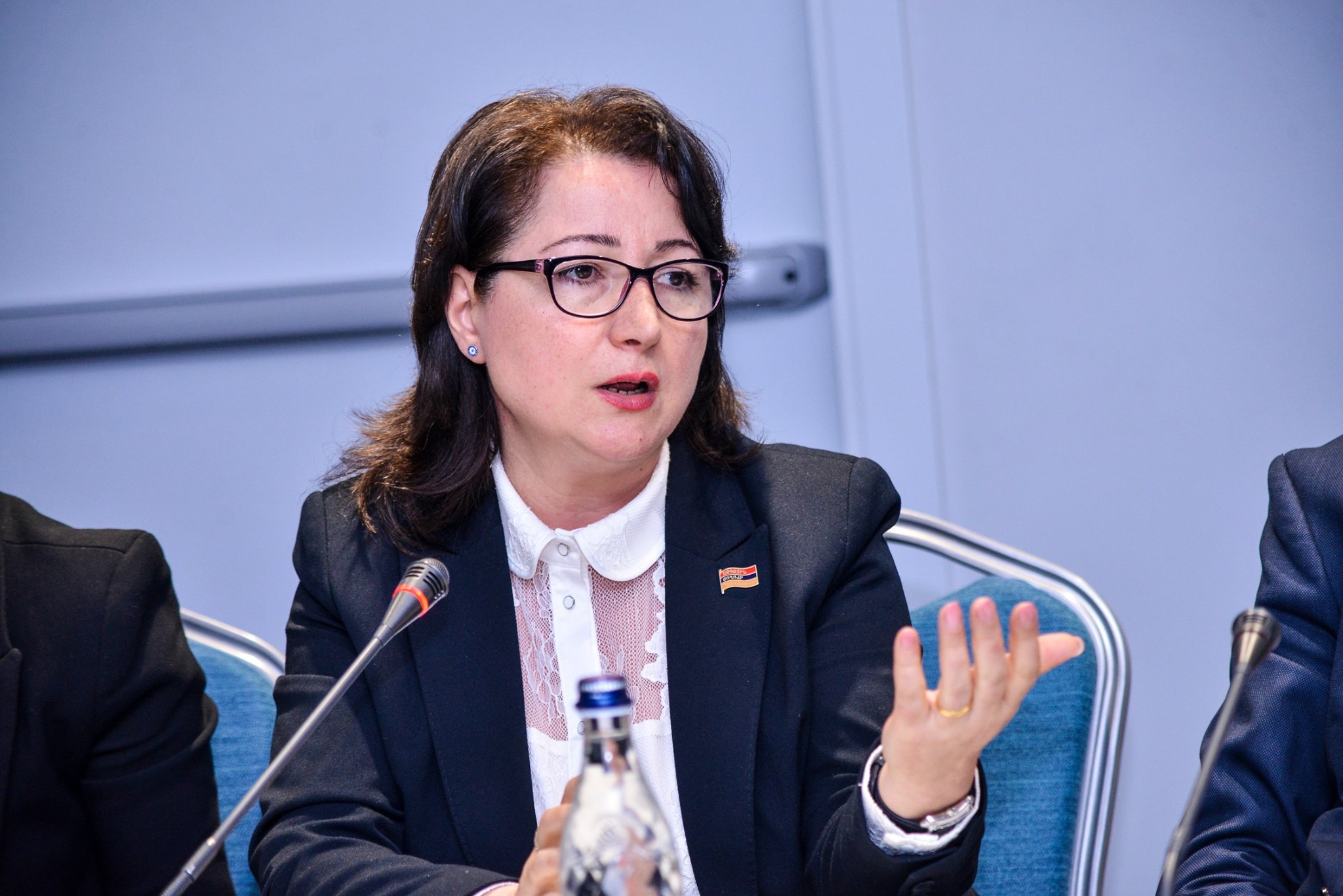
He8iqnaz Tigranyan
Prior to the adoption of the Draft, Heriknaz Tigranyan, a member of the “My Step” faction, former employee of the Transparency International Anti-Corruption Center (Executive Director is Sona Ayvazyan ), currently a member of the same organization, gave an interview to 1in.am on 28 June, 2019. From the 4th minute which states that an ad-hoc working group was created, which developed the Draft. Moreover, according to her, this draft was allegedly adopted by the civil society.
It should be noted that Tigranyan is the Deputy Chairman of the Standing Committee on Health and Social Affairs of the National Assembly, and not the Standing Committee on State and Legal Affairs. The emphasis of this circumstance is conditioned by the fact that the anti-corruption legislative activity is in the domain of the Standing Committee of State and Legal Affairs.
At the 3:40 minute of the interview, the deputy mentions that along with the dissolution of the National Assembly, the structure formed by it, that is, the Competition Board formed by the order K-195 signed by the RA NA President Ara Babloyan on 20 June, 2018, was dissolved. As we have already mentioned, this justification, to put it mildly, has nothing to do with the law, violated the RA Law on the Corruption Prevention Commission. However, in order to get some clarifications on this legal “nonsense” back in 2019, Iravaban․net addressed a question to the NA President, asking him to clarify the following:
- On the basis of what legal act was this working group established?
- When was it established?
- Who are the members of the group? Please provide the individual staff of the group.
- On what criteria were the members of this group selected?
- How were the proposals of civil society organizations collected?
- Which structures, including civil society organizations, have suggestions been received from? Please provide suggestions and the list of authors.
- Has the working group organized discussions on the draft proposals? If so, please provide a list of participating structures/entities invited to the public discussion.
- MP Heriknaz Tigranyan notes that the above-mentioned draft was developed by the working group, while the package of drafts was presented on the initiative of NA President Ararat Mirzoyan. After all, who developed the draft? If the working group worked it out, in which at least one deputy, Heriknaz Tigranyan, was included, then why is the draft not submitted together with the NA deputies?
At the 04:52 of the interview, the MP noted that the working group was unanimous on the issue that the Competition Board, should not be a mechanism for forming the Corruption Prevention Commission, any longer. Regarding this statement, we also asked for this decision of the working group, the protocol or a copy of the summary document.
As Heriknaz Tigranyan noted, the working group made the change of the competition order by the recommendation of the Government, the NA factions and the SJC. Iravaban․net had asked to provide that decision (protocol or document summarizing the work of the working group) copy:
In response to a number of our questions, the National Assembly informed:
“The Draft Law “On Making Amendments to the Law on the Corruption Prevention Commission” was the legislative initiative of NA President Ararat Mirzoyan as a deputy, during the elaboration of which consultative discussions were held with representatives of different bodies and specialists. No formal body has been established by any legal act.”
Iravaban.net also asked if the first Competition Board had been abolished, “if so”, we had asked for a copy of the relevant legal act.
This question remained unanswered.
In fact, the National Assembly, which is the legislative body of our country, avoided providing answers to a number of important questions. We can assume that this is either due to the fact that the latter are aware of their illegal behavior, or simply do not know what to say to this legal “nonsense”.
Referring to MP Heriknaz Tigranyan’s unsubstantiated statements, it should be noted that the national-international practice suggests that if CSO representatives participate in the discussion of any project, it should be done in an open environment, ensuring wide participation and transparency of actions, even if they are discussions of just “consultative nature.”
As we mentioned, Ararat Mirzoyan made an attempt to create a new Competition Board, but since it was not possible to predetermine the candidates nominated by some structures (Human Rights Defender, Chamber of Advocates, Public Council), and as a result indirectly participate in that process, NA President Ararat Mirzoyan decided to change the law, eliminate the Competition Board, and appoint CPC members exclusively through direct nominations, bypassing the participation of independent bodies and civil society structures in this process. As a result of the above-mentioned factual circumstances, there was a reasonable suspicion among the public, including specialized CSOs, that from the day he became NA President. Ararat Mirzoyan had a personal interest in the Corruption Prevention Commission, that is why he first tried to form a new Competition Board that fits him (which failed because the same members were nominated), and then changed the law, abolishing the Competition Board. He was assisted in this process by some deputies, who also have an obvious corporate interest in that body.
Former and current members of the Competition Board
According to Hovhannes Hovhannisyan, the candidate nominated by the Public Council in the Competition Council formed by NA Speaker Ara Babloyan, in a conversation with Iravaban.net, they had done a lot of work, they had worked on a database of questionnaires and tests for candidates for CPC members.
“We convened 5 sessions, had 6 working meetings. I have participated in all the sessions. What have we done? Test databases, requirements for candidates in terms of professionalism, public recognition, etc. have been developed. It was planned to conduct two stages: interview and testing, these criteria were also developed, as well as the procedure for conducting the interview, evaluation principles, components,” he said.
“Due to the political events taking place in the country, the functions to be performed by the Competition Board have been objectively postponed,” said the former member of the Competition Board. According to Hovhannisyan, some members of the Competition Board directly participated in the 2018 National Assembly and mayoral elections, we are talking about Vladimir Vardanyan and Naira Zohrabyan.
In response to our question whether they were notified and informed that the Board will no longer function, Hovhannisyan said, “The Government changed, the programs changed, that Competition Board, according to the newly created situation, was not necessary. No one gave official information, we just know that the members of the Corruption Prevention Commission were appointed without the Competition Board.”
He also mentioned that he noticed a problem of taking the quota of the Public Council. “The problem was that some structures wanted to take the quota of the Public Council, defined by law. In particular, “Transparency International” was trying to demand that quota to be given to them, to take their representative there, and it was as a result of an internal backstage struggle that Ararat Mirzoyan turned to Vazgen Manukyan. The Public Council decided that my candidacy should be reaffirmed,” Hovhannes Hovhannisyan said.
Mariam Zadoyan, a candidate nominated by the Chamber of Advocates, mentioned that they had several sessions in 2018, working on a questionnaire for candidates for members of the CPC. “There were cases when we appointed a day of the sitting, it was postponed for some reasons, but we had sittings. We had decided which of us should work on what. In fact, a huge amount of work was done, and in fact, due to the lack of political will of a few people and personal and narrow group interests, the work done by an entire Baird was wasted,” Mariam Zadoyan said.
We also got in touch with another member of the Competition Board, Naira Zohrabyan, who mentioned that as a whole she does not remember anything from the Board, as two years have passed and conditioned by the recent political events she no longer has the documents.
It should also be noted that Iravaban.net also sent a request regarding the work of the Competition Board to former member Vladimir Vardanyan, who represented the Constitutional Court (currently a member of the “My Step” parliamentary faction, chairman of the Standing Committee on State and Legal Affairs). We have not received the answer yet and if we receive it, we will present it additionally.
As for the member of the former and current Boards Mikael Khachatryan (representative of the Human Rights Defender), let us mention that he did not answer our verbal questions, instead the ombudsman’s spokesperson asked to send the questions in written form, the answers to which were not received and if we receive we will present them as well.
The response of international and local professional organizations
The Governing Board of the CSO Anti-Corruption Coalition of Armenia made a critical statement on the draft, noting that the mechanisms for nominating candidates for the post of CPC member and chairman are very pro-governmental. The appointments were made as a result of political agreements, endangering the independence of the CPC.
The 4th Evaluation Report of the Council of Europe Group of States against Corruption (GRECO), adopted on 6 December, 2019 and published on 12 December, 2019, contained assessments regarding the process of establishing the CPC.
In particular, the report stated that the Parliament has adopted a new law on the Commission for the Prevention of Corruption. This law removes the competition board from the process of appointment of members of the CPC and introduces a system of direct nominations by Parliament (one candidate is nominated by the Government, one by the ruling party in Parliament, two nominees by the two opposition parties in Parliament, and one nominee by the Supreme Judicial Council). The main concern with such a model is a significant risk of politisation. This is a vital point for the anti-corruption bodies as their insulation from political interference and influence stands as the main principle for ensuring their effectiveness. Also it is mentioned that the civil society organisations are currently not represented in the nomination or selection process. The Government and the ruling parliamentary faction could control the majority in the Commission. It appears that new amendments are being elaborated by the Government on the matter, providing for the direct nominations by Parliament of the first composition of the CPC and then for the re-introduction of a Competition Board. While GRECO understands the determination of the authorities to act promptly, it urges the authorities to ensure independence of the Commission for Prevention of Corruption, in particular through a balanced and sustainable composition and transparent procedures. GRECO wishes to stress that the current recommendation is to a large extent about operational independence of a corruption prevention authority.
Under pressure from the international community, it was decided to restore the Competition Board
The negative assessment voiced by the international organization was followed by the legislative initiative presented by the deputy of the National Assembly Suren Grigoryan․ It was proposed restore the Competition Board (Suren Grigoryan currently holds the position of Deputy Minister of Justice).
According to this amendment, which was adopted by the National Assembly on 12 June, 2020, the Board consists of member appointed by the Government, the factions of the National Assembly or the Council of the National Assembly, the Supreme Judicial Council, the Human Rights Defender and the Chamber of Advocates (Each body nominates one member).
The Public Council and the Constitutional Court were replaced by the SJC and the Government, and civil society organizations were excluded from the process (the Public Council is the constitutional body uniting CSOs).
At the same time, it should be noted that the Competition Board has been restored, and it will act in case of appointing a new member.
The current Competition Board
According to the order signed by the President of the National Assembly Ararat Mirzoyan on 19 February, 2021, the individual staff of the Competition Board for the election of a candidate for the position of a member of the CPC was approved.
These are:
1․ Liana Ghaltaghchyan – Deputy Chief of Staff of the Prime Minister of the Republic of Armenia
2․ Heriknaz Tigranyan – Deputy Chairman of the Standing Committee on Health and Social Affairs of the National Assembly
3․ Mikael Khachatryan – Head of the International Cooperation Department of the RA Human Rights Defender’s Office
4․ Irina Piloyan – Financial Director of the RA Chamber of Advocates, lawyer.
It should be noted that according to the order, the 5th member nominated by the SJC was Narek Gabrielyan. By the RA President’s decree of 8 April, 2021, he was appointed a judge of the Civil Court of Appeal, due to which the relevant point of the order on being a member of the Board was declared invalid on 14 April. The vacancy of the SJC member has not been filled yet, in fact the Competition Council operates with a staff of 4 people.

Liana Ghaltaghchyan
Two members of the Board, Liana Ghaltaghchyan and Heriknaz Tigranyan, are members of the Transparency International Anti-Corruption Center, and before receiving state positions, they worked in that center as well.
As Iravaban.net has already reported, on 6 June, 2021, the National Assembly discussed the candidacy of Tatevik Barseghyan, who was nominated for the vacant position of a member of the CPC by the decision of the Competition Board.
It is clear from the biography that the latter worked at the Transparency International Anti-Corruption Center (TIAC) in 2012-2019, and currently is a member of TIAC .
In addition, Tatevik Barseghyan’s husband Sos Avetisyan, is a deputy of the National Assembly from the “My Step” Party.
In 2017-2018, Avetisyan was coordinator for the civil society programs of the Open Society Foundations-Armenia (popularly known as the George Soros Foundation).
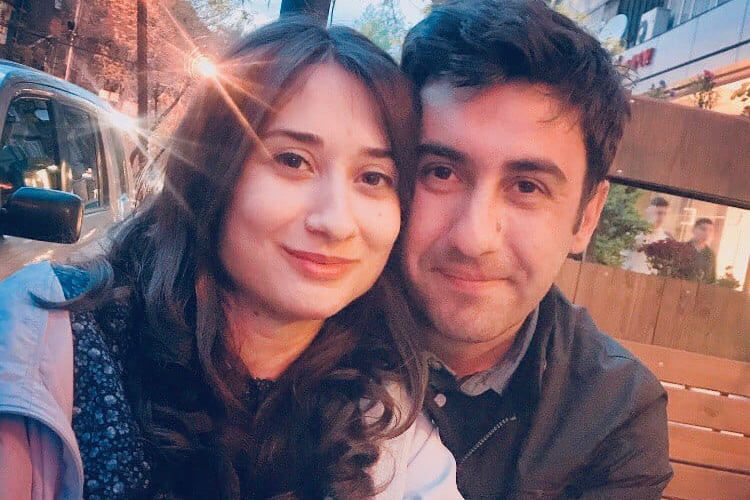
From Sos Avetisyan’s Facebook page
In fact, it turned out that 50% of the four-member Competition Board were the two members of TIAC, who elected the third member and presented it to the National Assembly.
This vicious process was strongly condemned by the Governing Board of the CSO Anti-Corruption Coalition of Armenia, which urged the National Assembly to cancel the illegal decision of the Competition Board and not to make another political appointment, which does not issue from the fight against corruption and does not meet such important criteria set out in the Jakarta Statement on the Principles for Anti-Corruption Agencies as: impartiality, neutrality, integrity and competence, independence and political neutrality.
As a result of the secret ballot held on the same day, Tatevik Barseghyan was not elected a member of the CPC. 74 deputies took part in the voting. 66 voted “for”, and 8 “against”.
In addition to Tatevik Barseghyan, the following individuals had applied for the vacancy of a candidate for a member of the CPC:
- Hamazasp Grigor Danielyan, he was a deputy of the National Assembly “My Step”, who resigned on 9 June, 2021.
- David Norik Sargsyan.
- Vardan Razmik Grigoryan.
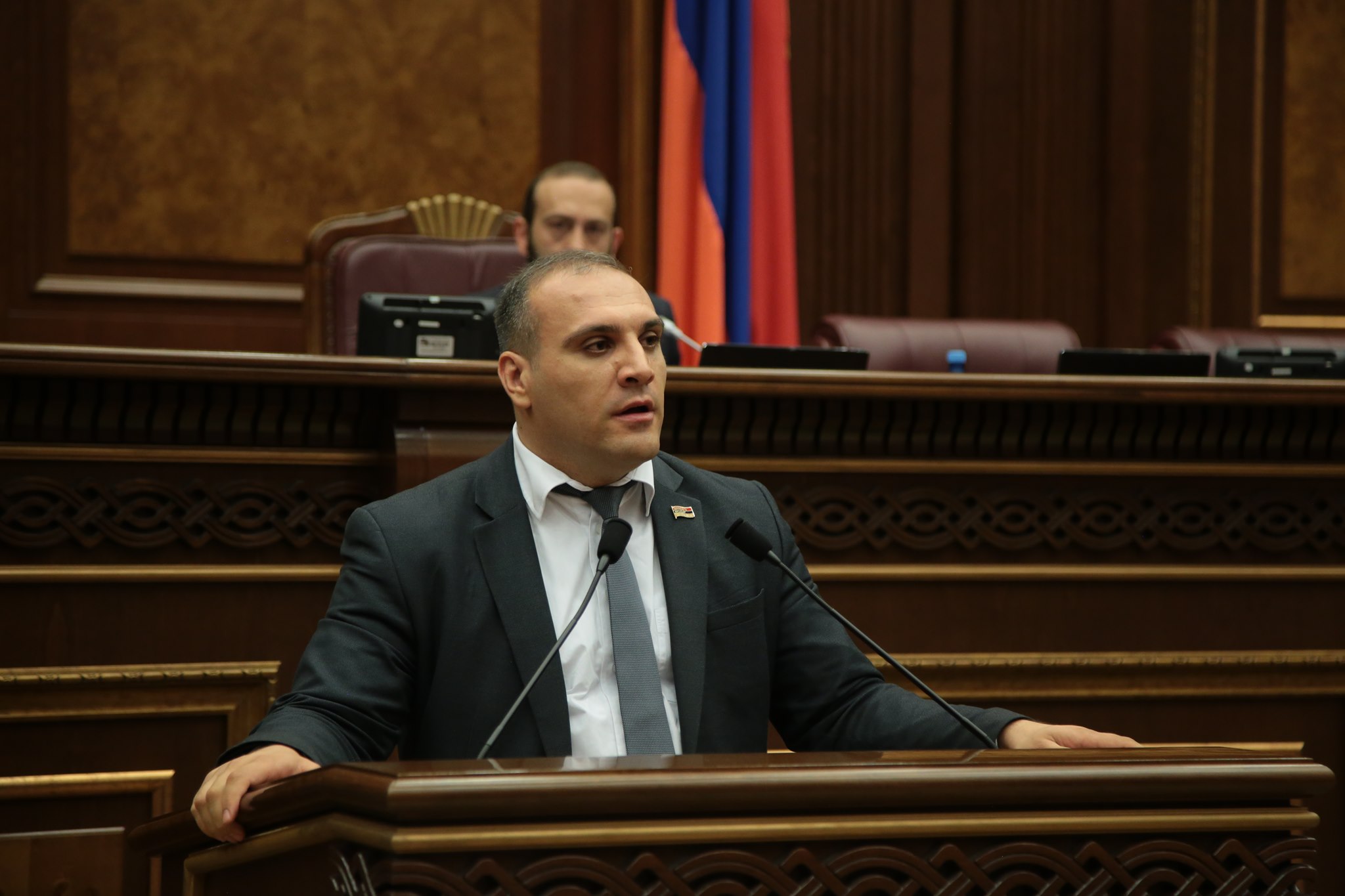
Hamazasp Danielyan
According to information that Iravaban.net has, Hamazasp Danielyan resigned because he was appointed to one of the leading positions of the USAID/Armenian Integrity Program implemented in Armenia with the financial support of USAID (the program is implemented in the field of anti-corruption). The program duration is 5 years. According to the same information, there are suspicions that this appointment was also conditioned: the latter resigns as a member of the CPC and is sent to work in this program. The Iravaban.net also learned that after Tatevikk Barseghyan was suddenly not elected a member of the Central Committee, she was also sent to work in the USAID/Armenian Integrity program. By the way, this program will work directly with the CPC throughout the whole implementation period, and the CPC also played a role in the appointment of these people.
It is disappointing that the appointment of positions in various sectors to fight corruption has become a bargaining subject and it is as a result of the placement of high-ranking officials that the fight against corruption in Armenia has become an artificial agenda.
PART 1-B. Members of the Sponsored Corruption Prevention Commission
The current members of the Corruption Prevention Commission were elected on 19 November, 2019.
Government candidate – Lilit Aleksanyan (for: 85, against: 15, invalid: 2),
Candidate of the NA “Prosperous Armenia” faction – Narek Hambardzumyan (for: 71, against: 31),
Candidate of the NA “Bright Armenia” faction – Haykuhi Harutyunyan (for – 90, against – 12),
Candidate of the Supreme Judicial Council – Aramayis Pashinyan (for – 85, against – 16, invalid – 1).
In addition to the above-mentioned 4 members, the candidate nominated by the NA “My Step” faction, Edgar Shatiryan (96 for, 6 against) was elected, made a statement on 26 November on resigning from the post of CPC member, “In the conditions of absolute distrust of the three members of the Corruption Prevention Commission, I do not consider it expedient to hold the post of a member of the Corruption Prevention Commission.”
An investigation by Iravaban.net revealed that members of the CPC, who have virtually no anti-corruption experience (as evidenced by members’ CVs and workbook entries), were not randomly selected individuals, but were directly sponsored by various officials.
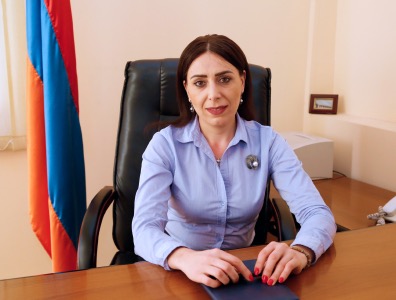
Haykuhi Harutyunyan
Haykuhi Harutyunyan, candidate of “Bright Armenia” faction
We have already written about the chairperson of the CPC, Haykuhi Harutyunyan, who is directly connected with the head of the NA “Bright Armenia” faction Edmon Marukyan and his wife, as well as a member of the same faction Taron Simonyan.
Besides, as we have already mentioned in the previous investigation, Haykuhi Harutyunyan was distinguished in terms of personal interest back in 2018, when she tried to coordinate the representatives of a group of non-governmental organizations by e-mail, raising concerns about the election of a member nominated by the Chamber of Advocates.
As a result, the non-governmental organization headed by Haykuhi Harutyunyan and a number of other organizations made a statement.
Also important was the fact that many of the organizations that signed the statement were funded at different times by a single source: Open Society Foundations – Armenia (popularly known as the George Soros Foundation), which for 21 years until April 16, 2021, was headed by Larisa Minasyan.
The whole previous investigation on this is available here.
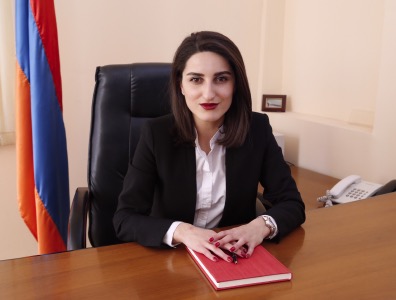
Lilit Aleksanyan
Lilit Aleksanyan, Government candidate
According to Lilit Aleksanyan’s CV, she studied at the Armenian State University of Economics, in 2010-2019 she worked at HSBC Bank.
It is noteworthy that the jobs of Lilit Aleksanyan and the former Chief of Staff of the Prime Minister of the Republic of Armenia Eduard Aghajanyan before taking public office, coincide
In 2018, both worked in the Risk Management Department of HSBC Bank.
It is obvious that the candidate nominated by the Government is directly affiliated with the former Chief of Staff of the Prime Minister Eduard Aghajanyan, and her nomination was conditioned not by rich anti-corruption experience, but by good partnership relations. Moreover, except for HSBC Bank, Lilit Aleksanyan had had no other job.
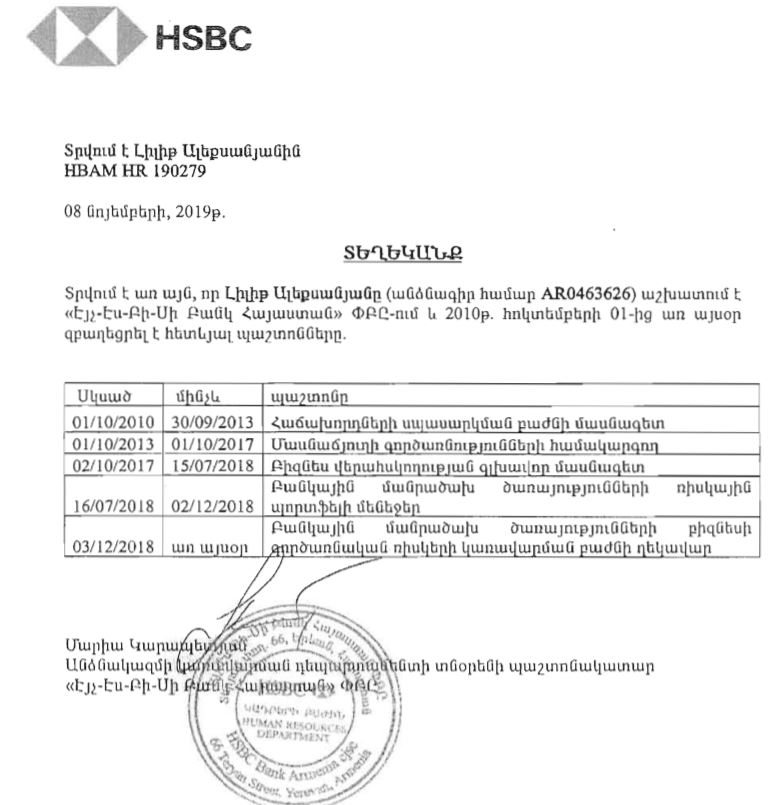
Eduard Aghajanyan
In 2018, worked in the Risk Management Department of HSBC Bank.
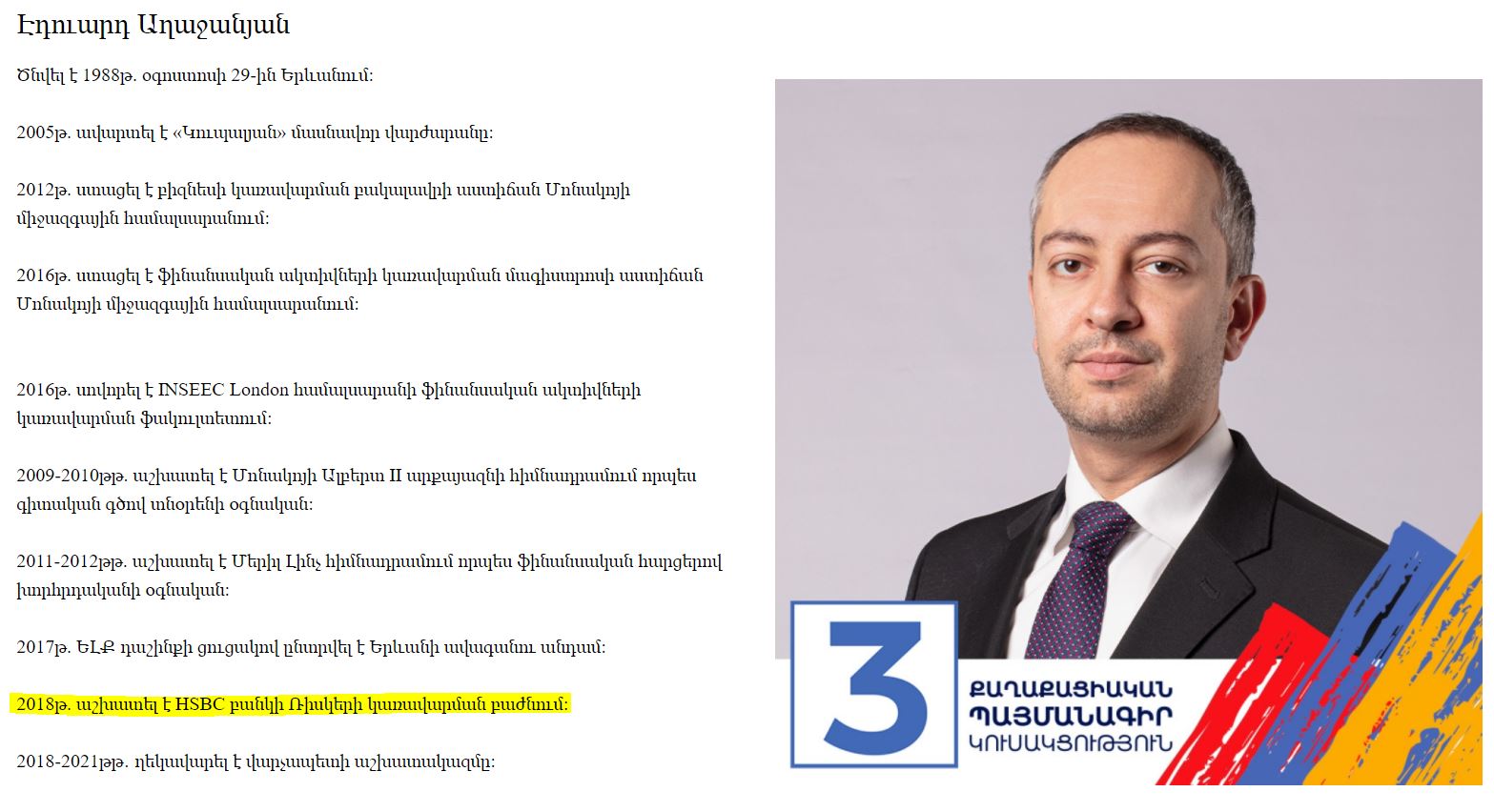
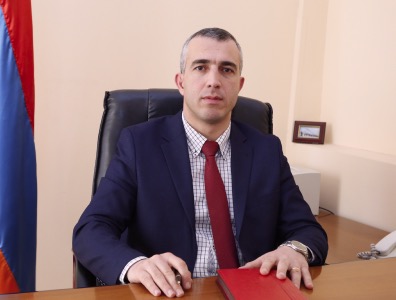
Aramayis Pashinyan
Aramayis Pashinyan, SJC candidate
Aramayis Pashinyan’s CV does not reveal his connection with the SJC in any way, and the public has a reasonable question why the SJC nominated him. However, as a result of the study of open data, it became clear that he is the husband of Lilit Galyan, the sister of Srbuhi Galyan, the first class adviser of Justice, the Deputy Prosecutor General of the Republic of Armenia.
It should be reminded that when Aramayis Pashinyan was appointed a member of the CPC, Srbuhi Galyan was then the Deputy Minister of Justice of the Republic of Armenia, who coordinated the anti-corruption sphere, and participated in the discussions of amendments and additions to the Law on CPC on behalf of the Government.
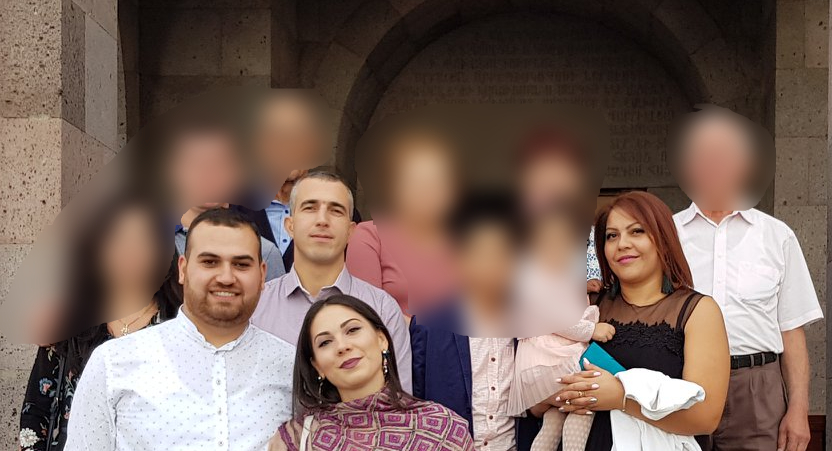
From Lilit Galyan’s Facebook page
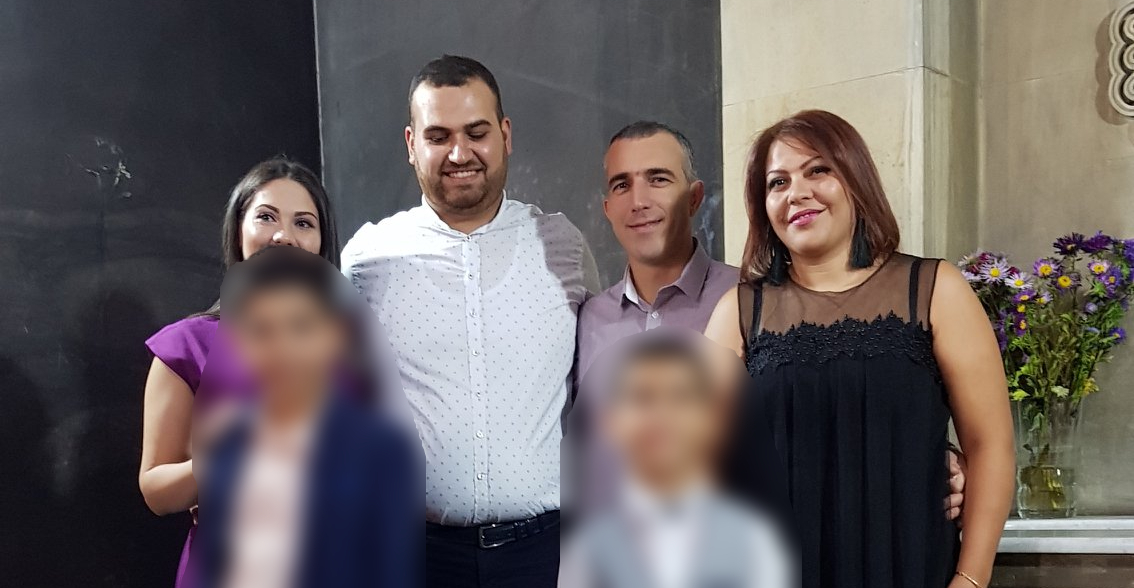
From Lilit Galyan’s Facebook page
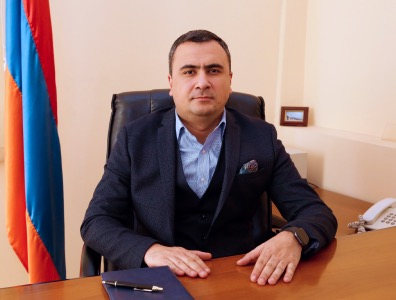
Narek Hambardzumyan
Narek Hambardzumyan, PAP candidate
In 2014-18, Narek Hambardzumyan held the position of Investigator of the Department of Investigation of Corruption-Related Crimes, Crimes against Property and Cybercrimes of the Investigation Committee. Prior to his appointment, he worked for about two years, in 2018-2019, at “Glanzh Alco” LLC, as Deputy Chief Financial Officer.
Let us add that according to the information mentioned on the official website of the company, “Glanzh Alco” is a company producing wine, brandy and vodka. It is located in Aramus village of Kotayk region (editorial: the city closest to Aramus village is Abovyan) .
When the issue of his candidacy for the post of a member of his CPC was discussed in the National Assembly the deputies were asking questions to the candidates, the NA President Ararat Mirzoyan inquired, “Does this LLC have any connection with any person holding a public position or not?”
In response to the question, Narek Hambardzumyan mentioned, “Glanzh Alco LLC has nothing to do with any political force, it is our family organization, it was founded in 1995 by my father, in general, there has not been any official in our family, except me.”
The other question asked to Hambardzumyan referred to his affiliation with the PAP. In response to the deputy’s question, he mentioned that he has relation with the PAP. “I can assume that the faction has nominated my candidacy, taking into account my personality, education, past path, as a state official, my image in the society.” In other words, it turns out from this answer that out of thousands of investigators, the PAP accidentally chooses the candidate who left the law enforcement system for about two years, who was a businessman, was engaged in business. We leave the conclusions to our reader.
Thus, in fact, it turns out that the appointments of the members of the CPC were made not on the basis of experience and professional skills, and matching positions, but as a result of political agreements of different groups.
PART 2. Appointment of the RA Deputy Prosecutor General coordinating the sphere of functions aimed at confiscation of property of illicit origin
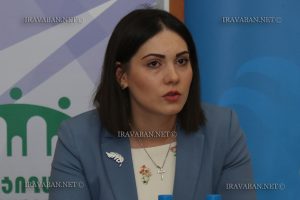
Srbuhi Galyan
The post of the RA Deputy Prosecutor General has been created in the RA General Prosecutor’s Office, which coordinates the field of confiscation of property of illicit origin. Open competitions were held to fill the lists of candidates for the post of Prosecutor General, Deputy Coordinator in this field. The competitions were held by the qualification commission attached to the RA Prosecutor General.
Two candidates had applied to run for the post of Deputy Prosecutor General, one of whom was Srbuhi Galyan, the RA Deputy Minister of Justice. The latter coordinated the development of anti-corruption policies in the ministry, including the creation of an organizational structure for the creation of an anti-corruption institutional system, including the confiscation of property of illicit origin of the General Prosecutor’s Office, with the creation of a new post of the Deputy Prosecutor General, which she held.
It should be noted that one of the candidates did not participate in the competition, as a result of which it turned out that only one candidate for Deputy Prosecutor General participated in the competition, but the latter was elected and appointed in the absence of an alternative candidate. Thus, the only candidate who participated in the competition, was Srbuhi Galyan, who was appointed to the position.
It should be noted that Article 23, Clause 7 of the Law on the Corruption Prevention Commission (Functions and Powers of the Commission) stipulates that in cases and in accordance with the law, candidates for members of the Supreme Judicial Council, candidates for judges of the Constitutional Court, candidates for judges, as well as in other cases provided by law the Commission shall provide advisory opinion on integrity which is not subject to publication.
Pursuant to Article 38․1 of the Law on the Prosecutor’s Office, the candidate for the post of Prosecutors and the Deputy Prosecutor General carrying out functions aimed at confiscating property of illicit origin shall must submit a completed questionnaire on integrity provided by the Law on the Corruption Prevention Commission.
It turns out that the advisory opinion on Srbuhi Galyan’s integrity questionnaire was provided by her sister’s husband, Aramayis Pashinyan, who has already been appointed a member of the CPC.
PART 3. Anti-Corruption Policy Council
The Anti-Corruption Council was established on 19 February, 2015 by Government Decision No. 165-N. In addition to officials, two seats in the council were provided to NGOs. As a result of the long-term efforts of the CSO Anti-Corruption Coalition of Armenia, the 2 places for NGOs became 5, one of which was allocated to the Coalition as the largest network uniting the anti-corruption potential in the NGO sector.
By the decision of the Prime Minister of the Republic of Armenia No. 808-N on 24 June, 2019, Decision No. 165-N of the Government of the Republic of Armenia of 19 February, 2015 was repealed, and a new Anti-Corruption Policy Council was established, the purpose and powers of which were the same as the Anti-Corruption Council’s. By the mentioned decision of the Prime Minister of 2019, the CSO Anti-Corruption Coalition of Armenian was unjustifiably removed from the Anti-Corruption Policy Council without even notifying the Coalition in advance. The Coalition attributes this to the fact that high-ranking individuals in the Prime Minister’s Office are affiliated with individual sectoral CSOs and driven by narrow corporate rather than public interests, making the Council formal, inefficient and politicized. Moreover, the journalistic investigation previously published by Iravaban.net states that the tender for the inclusion of NGOs in the current Anti-Corruption Policy Council was conducted with violations, the results of which are illegal for the three NGOs;
These organizations were:
- Transparency International Anti-Corruption Center NGO
- “Informed Citizens Union” Consulting NGO,
- Freedom of Information Center “NGO.
These organizations are still illegally members of the Council.
Let us also remind the connection of two of these NGOs with the government ․
At the 22 August sitting, the Government decided to allocate 33 million 680 thousand drams from the reserve fund to two non-governmental organizations to observe the local self-government elections to be held on 8 September, 2019 in Artsakh.
16 million 200 thousand drams were allocated to the Stepanakert office of the Union of Informed Citizens and 17 million 480 thousand drams to the Transparency International Anti-Corruption Center, without a tender.
During 2019-2020, the Ministry of Justice of the Republic of Armenia, trying to ensure the membership of specialized organizations in the Anti-Corruption Policy Council, has several times drafted a decision on amending and supplementing the Prime Minister’s Decision No. 808-N of 24 June, 2019, which would allow the Coalition as an informal network uniting 71 CSOs, to be competitively included in the Anti-Corruption Policy Council having no state registration. The last draft was developed by the Ministry of Justice and published on e-draft.am platform on 03.09.2020. The Transparency International Anti-Corruption Center also openly expressed its indignation at this draft, based not on legal but narrow group justifications. This outrage, however, was “dispelled” by the Prime Minister’s Chief of Staff Liana Ghaltaghchyan (who previously worked and is now a member of TIAC), who intervened in the process and “helped” the Government not approve the draft and return it to the Ministry of Justice. Thus, suspicions were raised that the government official, who was not guided by state interests but by narrow group interests, in fact showed high devotion to her organization and fulfilled the will of her colleagues.
The investigation in this regard will be completed soon.։
PART 4: Anti-Corruption Committee
The other body of the anti-corruption institutional system is the Anti-Corruption Committee. Considering that the Competition Board formed for the election of the Chairman of the Committee is still being formed, the Chairman of the Committee has not been elected, so we will refer to the processes related to this body in the near future.
However, it should be noted that the Governing Board of the CSO Anti-Corruption Coalition of Armenia issued a statement on 9 June, stating that “The CSOs Anti-Corruption Coalition Armenia, taking into account the vicious practice of election of the Competition Board members for the election of the members to the Corruption Prevention Commission, has issued a condemning statement on 4 June, announces that it will not participate in the competition for the election of two members from the Civil Council to be included in the composition of the Competition Board.
Moreover, the Coalition questions this unjustified haste in the conditions under which the competition is organized during the pre-election campaign for the early parliamentary elections in Armenia under the veil of suddenness, false democracy and transparency. Therefore, the Coalition calls on the Government to refrain from holding the above-mentioned formal competition and making political appointments under its veil until the end of the extraordinary parliamentary elections and the formation of the new composition of the National Assembly. Earlier, the Coalition expressed a negative opinion on the appointment of the chairman of the Anti-Corruption Committee, other officials and other important provisions, as it would be a political party-group interest-led, government-sponsored, one-person political appointment by the Prime Minister. From the outset, such formulation does not meet such important criteria set out in the Jakarta Statement on the Principles for Anti-Corruption Agencies as: impartiality, neutrality, integrity and competence, independence and political neutrality. Therefore, the formation of anti-corruption bodies through corrupt behavior and conflicts of interest is doomed to failure from the beginning. And we, as pioneers in the fight against corruption, cannot be participants in it.
From the composition of the Competition Board formed for the election of the chairman of this committee, only the name of the government representative is known: Mariam Galstyan, the head of the anti-corruption policy development and monitoring department of the Ministry of Justice of the Republic of Armenia.
Thus, the aforementioned shows the failed anti-corruption institutional system, the main actor of which is the RA NA President Ararat Mirzoyan. All this distorts the legal sphere, the anti-corruption struggle, as a result of which every citizen of the Republic of Armenia suffers, it hits the statehood and authority of the Republic of Armenia.
Notice – The presented is exclusively a professional investigation, which is based on facts, the fact-finding work started in 2019. It has nothing to do with any political force or direction and cannot be considered as propaganda and/or anti-propaganda.
Alisa Chilingaryan


